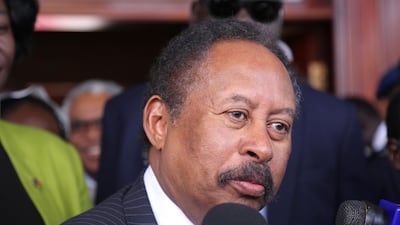Sudan’s Prime Minister Abdalla Hamdok is making a rare visit to Washington this week to try to begin a historic thaw in US relations.
Mr Hamdok arrived in Washington on Sunday, becoming the first Sudanese leader to visit the US capital since 1985.
The last was President Gaafar Nimeiri, who attended a White House meeting with president Ronald Reagan.
Since then, US-Sudan relations have deteriorated as instability and military coups rocked the nation.
The rise of Omar Al Bashir to power in 1989 poisoned relationships with successive American administrations until his removal in April.
In 1993, the US added Sudan to its list of state sponsors of terrorism, then imposed a trade embargo and crippling sanctions to punish Khartoum for links to extremist organisations and Iran, and its role in the genocide in Darfur.
On this visit, Mr Hamdok will try to turn that page. He is meeting senior officials from the state, treasury, defence, justice, education and commerce departments.
He will also meet ranking members of Congress and heads of foreign relations committees.
Accompanying Mr Hamdok are Sudan’s ministers of foreign affairs, sports, justice, finance, defence and religious affairs, appointed by the transitional government.
The White House has not confirmed if Mr Hamdok will be meeting US President Donald Trump or Vice President Mike Pence, but he is expected to meet National Security Adviser Robert O’Brien.
He will also hold meetings at the World Bank and International Monetary Fund.
"The visit is extremely significant," Cameron Hudson, a senior fellow at The Atlantic Council's Africa Centre, told The National.
“It truly signals a new era in the US-Sudan relationship and it should not be understated that this is the first time in 34 years that a Sudanese leader has been welcomed in Washington.”
Mr Hamdok’s US visit follows a tour he embarked on since taking office last August.
It began in New York at the UN in September and he then travelled to Europe to try to end Sudan’s economic isolation and bring it out of cold after three decades of Mr Al Bashir's rule.
Senior European officials from Germany, Sweden, Finland and Britain have also visited Sudan in the past two months.
The Trump administration has appointed diplomat Daniel Booth as special envoy to Khartoum, and the undersecretary of state for political affairs, David Hale, visited Sudan in August.
Intelligence sharing, the Nile Dam dispute and China’s growing influence in the African continent are expected to be under discussion this week, but one issue will take highest priority.
A successful visit, Mr Hudson said, would mean Mr Hamdok “can leave Washington having normalised the bilateral ties, established relationships of trust with US officials, and created a set of shared expectations and timelines for how the bilateral relationship can be further improved".
Relations saw some progress in 2015 but are not fully normalised. Barack Obama’s quiet engagement with Khartoum led to some sanctions being loosened.
In 2017, the Trump administration lifted a 20-year trade embargo on Sudan, and the CIA opened an office there.
After Mr Al Bashir's removal, the US prioritised an orderly civilian transition as a critical condition to moving the relationship forward.
But last October, Mr Trump again signed the declaration of a national emergency that brands Sudan as a threat.
“Despite recent positive developments, the crisis constituted by the actions and policies of the government of Sudan that led to the declaration of a national emergency has not been resolved,” he said in a letter to Congress.
Mr Hudson did not expect Sudan to be removed from the terrorism list this visit but “it should pave the way for that outcome".
Statutory requirements and “greater assurances that the risk of Sudan backsliding, either under Hamdok or after the transitional period, is minimised” would first be required by the US, he said.
Even if it happens, Mr Hudson said a delisting would not solve all of Sudan’s problems.
But it would allow the country easier access to private capital markets and concessional lending from international financial institutions, he said.
More significantly, it would signal “once and for all the end of Sudan’s pariah status", Mr Hudson said.
Jonathan Schanzer, vice president of research at the Foundation for Defence of Democracies, saw an opportunity in Mr Hamdok’s visit “to turn a new leaf and create a path for removal from the terror list.”
But Mr Hamdok's government must completely rid itself off the baggage of the Bashir regime, Mr Schanzer said.
This would mean ending any ties with terror groups designated by the US such as Al Qaeda, Hamas and ISIS, continuing to move away from Iran’s influence, and ridding itself of notorious elements from the old regime, he said.
Sudan hosted former Al Qaeda leader Osama bin Laden between 1991 and 1996.
“The US Government has to judge the current government in Sudan by its actions,” said Mr Schanzer, a former Treasury official.
Part of the assessment would also include the “extent of the regime sponsoring of militias in South Sudan".
Last August, the US government sanctioned former Sudanese intelligence chief Salah Gosh for committing “gross violations of human rights".

